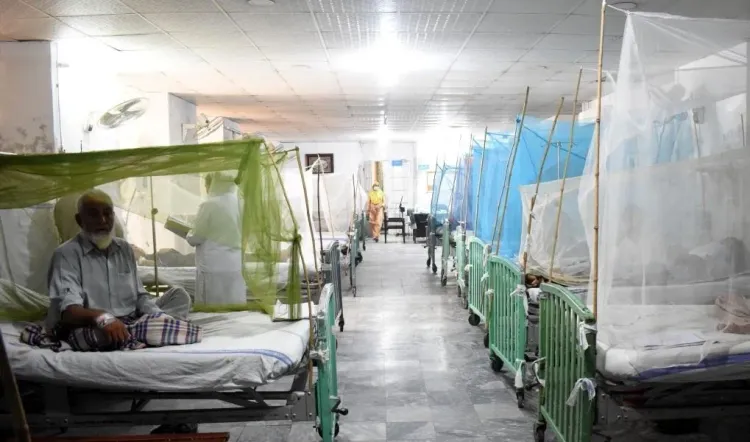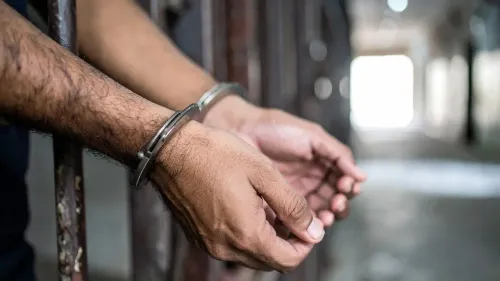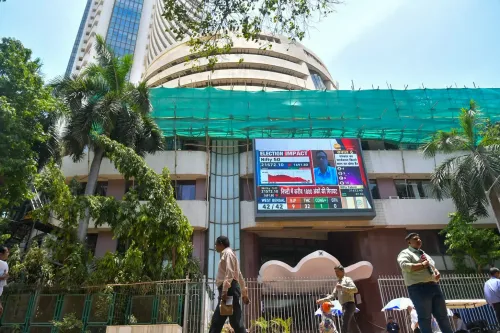What Are the Latest Dengue Case Reports in Pakistan?

Synopsis
Key Takeaways
- 32 new dengue cases reported in Islamabad and Rawalpindi.
- Health officials emphasize preventive measures to mitigate spread.
- Community involvement is critical in controlling outbreaks.
- Early detection can significantly lower fatality rates.
- Proper sanitation practices are essential for public health.
Islamabad, Sep 23 (NationPress) In a concerning development, 32 new cases of dengue have emerged in the cities of Islamabad and Rawalpindi, as reported by local media on Tuesday.
The District Health Office (DHO) in Islamabad disclosed that the capital witnessed 12 new cases. Of these, 11 were reported from rural areas while one case surfaced from urban regions. In Rawat, five cases emerged, with additional cases recorded in Tarlai (two) and one each from Koral, Sohan, Tarnol, Bhara Kahu, and I-14, according to Dawn.
An official from the DHO stated, "Currently, 12 patients are hospitalized and all responses to the cases are executed following the protocols set by the World Health Organization (WHO)."
The DHO of Islamabad has urged citizens to implement preventive measures, particularly by regularly cleaning water containers, tanks, and coolers to mitigate the spread of dengue. Residents are encouraged to actively participate in safeguarding their health and that of their communities.
In a separate report, 20 new dengue cases were recorded on Monday, bringing the total number of cases for this season to 477. Additionally, 438 individuals sought treatment at three government hospitals on Monday due to symptoms like fever and back pain, with 37 confirmed positive for dengue.
Among the 37 confirmed cases, 20 were identified in Rawalpindi, while the others were distributed across Islamabad and surrounding districts, including Murree, Attock, Jhelum, and Chakwal. New cases were observed in various areas of Rawalpindi, including Kotha Kalan, Peshawar Road, Takht Pari, Sukho, Chak Jalal Din, Mohanpura, Naseerabad, Dhoke Ali Akbar, and Dhoke Syedan.
Dengue is a viral illness caused by the dengue virus (DENV), transmitted to humans through mosquito bites. This disease is prevalent in tropical and subtropical regions globally, primarily affecting urban and semi-urban areas, as noted by the WHO. Prevention relies heavily on controlling the mosquito population. While there is no specific treatment for dengue, early detection and access to appropriate medical care have been shown to significantly reduce fatality rates associated with severe dengue.
Meanwhile, during an inspection led by Assistant Commissioner Aqsa Imtiaz alongside Deputy District Health Officer Dr. Babar Hayat, dengue larvae were discovered in various locations in Hassanabdal. The inspection included residential areas, graveyards, marriage halls, junkyards, and block factories, resulting in immediate legal action against those responsible, as reported by Dawn.
Assistant Commissioner Aqsa Imtiaz has called for urgent measures to eliminate potential mosquito breeding sites, particularly areas with stagnant water. She emphasized that dengue poses a significant health threat and urged residents to maintain cleanliness in their homes, rooftops, and courtyards, cover water tanks, and avoid storing water in open containers. Parents and teachers were also encouraged to ensure that children wear full-sleeved clothing to reduce the risk of mosquito bites.









